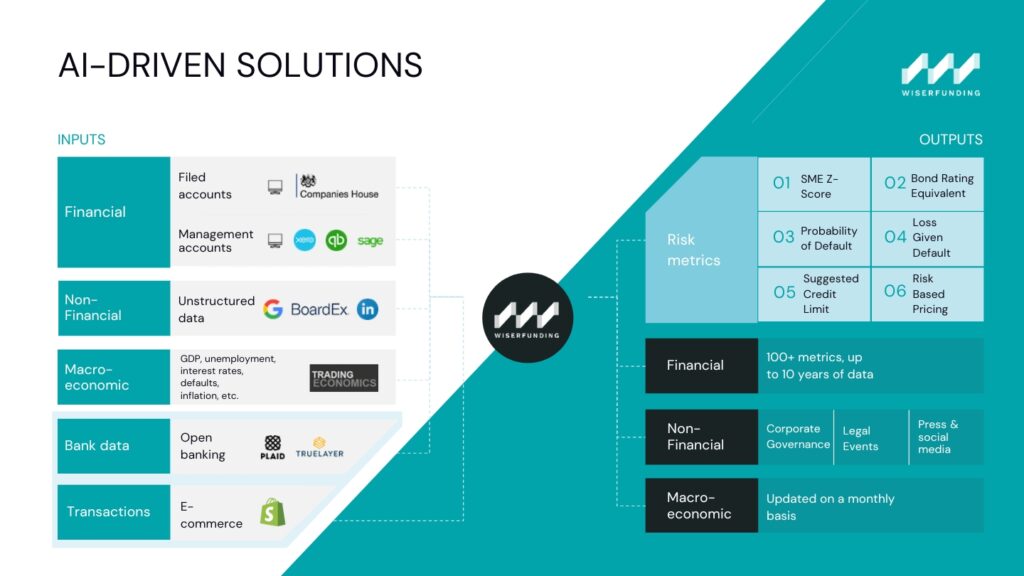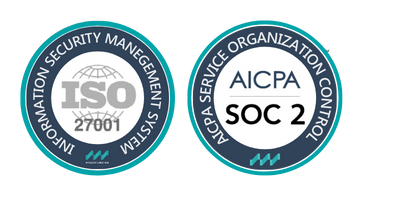How AI Drives Our Solutions at Wiserfunding
At Wiserfunding, AI is at the heart of our cutting-edge solutions. Our technology now delivers precise credit risk assessments in seconds, empowering lenders to make quick and effective decisions. This advancement highlights how AI is reshaping the financial industry by addressing issues like slow decision-making and disorganised workflows.
AI’s Impact on the Financial Industry
AI is transforming SME lending by updating outdated processes with automation. It speeds up credit assessments, boosts accuracy, and facilitates quicker loan approvals using advanced predictive models and real-time risk management. Additionally, AI enhances compliance and security by rapidly detecting fraud and handling large datasets, resulting in more efficient operations and tailored service for SME lenders.
However, AI regulation remains in its early stages, with substantial gaps in available information. It will take time to determine the best practices for implementation and to see how governments address future regulatory requirements. The current advances in computing power allow for more sophisticated data processing and AI model training, with a shift towards models that better simulate human behaviour and thought. This evolution represents a major leap in AI technology, driving significant changes in the financial industry.
How AI Enhances Automation
Operational Efficiency and Enhanced Decision-Making: AI automates repetitive tasks, boosting efficiency and allowing staff to focus on strategic activities. By rapidly processing data, AI supports more precise and informed decisions, notably accelerating the credit decision making from lead enquiry to loan approval.
Advanced Model Development and Efficient Data Processing: AI excels in developing and refining predictive models, which are crucial for accurate risk assessment and evaluating creditworthiness. It also processes and analyses large datasets to extract valuable insights, improving decision-making and providing a comprehensive view beyond traditional methods.
Proactive Risk Management and Improved Compliance: AI enhances regulatory compliance by detecting suspicious activities and fraud in real-time, safeguarding assets and ensuring adherence to regulations. Additionally, AI’s real-time alerts and early warnings help manage and mitigate risks proactively, addressing potential threats before they escalate.
To maximise AI’s potential, begin by identifying key processes and analysing where AI can add the most value. This approach can significantly reduce the time required to move from lead enquiry to loan approval, streamlining the entire process.
To maximise AI’s potential, begin by identifying key processes and analysing where AI can add the most value. This approach can significantly reduce the time required to move from lead enquiry to loan approval and then portfolio management and monitoring, streamlining the entire process.
How Wiserfunding Solutions Transform SME Lending:

Wiserfunding’s AI-driven solutions revolutionise the credit lifecycle for SME lenders by improving efficiency, accuracy, and speed at every stage. From automated data collection to tailored risk assessments and proactive monitoring, our technology helps lenders navigate the financial landscape with ease.
Contact us today to learn more and elevate your credit management to the next level
SIMILAR POSTS

12 March 2025
Stock Sell-Off Leads to Nasdaq’s Worst Day Since 2022
Are Credit Markets Signaling Trouble? Insights from Professor Edward Altman on Systemic Risks and Defaults in His Bloomberg Interview. [...]

Wiserfunding Attends Private Credit Connect in London 2025
We are excited to announce that Wiserfunding will attend Private Credit Connect London on March 26th. This exclusive event [...]

Defaults and Recoveries: Navigating Risk in Private Credit
When it comes to understanding credit risk, many models assume that defaults and recovery rates are independent. However, deeper [...]



